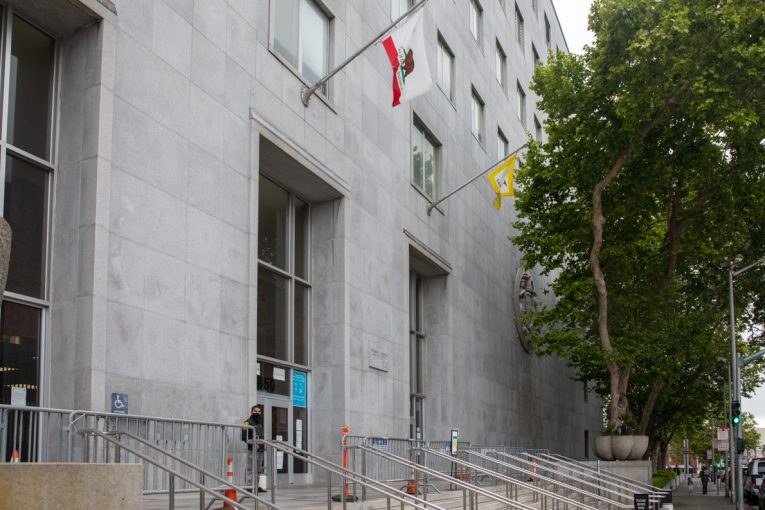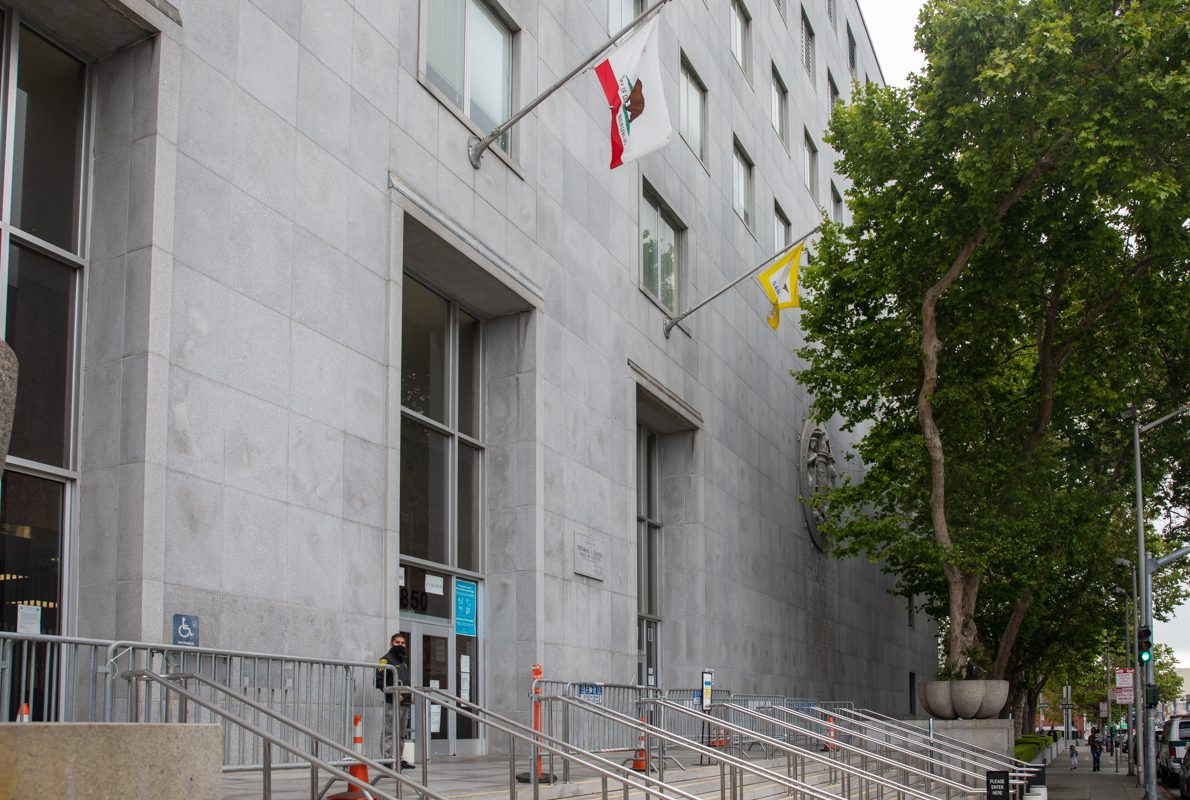
San Francisco Hall of Justice – Photo by David M. Greenwald
“The District Attorney’s Office has the sole discretion over what cases to file, and no matter how unjust and unfair the charges are, and how vulnerable and complex the needs are of individuals charged, our Public Defender’s Office continues to stand with as many of these individuals as we reasonably can to protect their due process.” – Mano Raju
SAN FRANCISCO, CA – Last week, San Francisco Public Defender Mano Raju pushed back sharply against District Attorney Brooke Jenkins’ recent accusations that the city’s courts and public defenders are to blame for a backlog of criminal cases, saying the crisis stems from Jenkins’ own office flooding the courts with “frivolous and unsubstantiated cases.”
“The reality is that the courts and defense attorneys would not be so overwhelmed if the District Attorney’s Office weren’t filing so many frivolous and unsubstantiated cases,” Raju said. “The District Attorney’s Office has the sole discretion over what cases to file, and no matter how unjust and unfair the charges are, and how vulnerable and complex the needs are of individuals charged, our Public Defender’s Office continues to stand with as many of these individuals as we reasonably can to protect their due process.”
According to Raju, the DA’s filings have surged nearly 60 percent since 2021, a trend he says has “predictable results: filling our jails to over capacity and increasing our caseloads to a breaking point.” He emphasized that the Public Defender’s Office declared itself unavailable one day per week in misdemeanor and some felony cases to meet constitutional standards for effective counsel.
“When we made the difficult decision to declare unavailable in a limited number of cases, we did so to ensure we can still meet our Constitutional duty to provide effective assistance of counsel to our clients,” Raju said. “As with most public defender offices across the country that are grossly underfunded compared to district attorneys and other law enforcement agencies, all we are seeking is parity and fairness in resources so that indigent individuals get the quality of representation that everyone deserves.”
Raju pointed to trial results as evidence of what he described as “systemic overcharging” by the DA’s Office. In 2025, public defenders tried 56 felony cases, winning not guilty verdicts or hung juries in 52 percent of them, and achieving mixed verdicts in another 25 percent. For misdemeanor cases, they secured not guilty verdicts in 51 percent and mixed verdicts in another 25 percent, while the DA obtained full convictions in just 24 percent of cases.
The data, Raju said, “demonstrate a strong record of success and underscore that too many prosecutions lack merit.”
The San Francisco Public Defender’s Office shared charts from its June 2025 budget presentation showing steep increases in DA filings and major funding disparities between defense and law enforcement agencies. The office’s budget stands at roughly 60 percent of the District Attorney’s, despite representing 75 to 80 percent of people charged in the city.
“Our budget is about 60% of the District Attorney’s budget even though we represent approximately 75% to 80% of people charged in San Francisco and representing a client is more time- and labor-intensive than prosecuting a case,” the office noted in its report.
Public defenders operate on a general fund budget of $54.6 million for fiscal year 2024–25. By comparison, the San Francisco Police Department’s budget is $659.8 million, the District Attorney’s is $84.1 million, and the Sheriff’s Department’s is $246.1 million. “The SFPD, D.A., and Sheriff’s office budgets over the last 10 years have ballooned to sizes that greatly exceed that of our office,” the report stated.
In response to the growing strain, Chief Attorney Matt Gonzalez and Raju notified Presiding Judge Rochelle C. East on May 2 that the Public Defender’s Office would begin declaring unavailability in misdemeanor arraignments and select felony cases. The decision, Gonzalez wrote, followed “a careful evaluation of our constitutional obligations and staffing capacity in light of the recent proliferation of arraignments.”
According to the letter, San Francisco arraignments rose 57 percent since 2021, from 5,002 to 7,841 by 2024, with more than 200 additional cases already filed in the first four months of 2025. The number of pending felony cases has grown 40 percent since 2020, and misdemeanor caseloads are up sharply as well.
“Our office offers a wide array of services to meet the challenges posed by law enforcement, who aggressively take action against the populations we serve,” Gonzalez wrote. “Our felony and misdemeanor divisions have seen an unprecedented increase in the volume of cases they handle.”
The Public Defender’s Office also cited DA budget documents stating that the DA and police anticipated arresting “more people” in 2025–26, with an estimated 2,000 more cases filed annually. “Without commenting on the efficacy of these law enforcement priorities,” Gonzalez wrote, “we note the obvious downstream impact such actions have on our caseloads and workloads.”
District Attorney Jenkins, meanwhile, has accused the court and the public defender of negligence, calling the situation a “dereliction of duty.”
“What is new is that the court has become complicit in this by now stating that they are going to release potentially dangerous and violent felons back into the community because of what’s happening,” Jenkins told KQED. “The court has the power to appoint the public defender, whether or not they are saying they don’t have the capacity.”
She also questioned the public defender’s justification, saying, “That is not adding up. They didn’t say in 2019, when the numbers were at their highest, that they were unable to manage their caseloads.”
The San Francisco Public Defender’s Office responded that it has been systematically underfunded and forced to manage workloads that far exceed professional norms.
“The Public Defender’s Office takes seriously our constitutional duty to provide effective representation to indigent persons facing criminal charges in San Francisco,” the office said in a statement. “That is why we are also duty bound to decline new cases when—due to understaffing and underfunding by the City—accepting new cases will compromise the quality of representation we can provide to our existing clients.”
The office maintained that declaring unavailability was a necessary but temporary measure to safeguard constitutional rights, emphasizing that caseloads remain unmanageable despite the step.
“San Francisco public defenders continue to take on the vast majority of new cases and continue to face overwhelming caseloads,” the office said. “This is despite the fact that the District Attorney has increased filings by nearly 60% over the past three years. Many of those cases represent misdemeanor ‘quality-of-life’ charges against people suffering from poverty and substance use disorder who would be better served not by the carceral system, but by public health and housing services.”
As both sides continue to trade accusations, the data suggest an escalating crisis in San Francisco’s criminal legal system—one driven by a surge in prosecutions, widening funding disparities, and an increasingly strained defense infrastructure.
Follow the Vanguard on Social Media – X, Instagram and Facebook. Subscribe the Vanguard News letters. To make a tax-deductible donation, please visit davisvanguard.org/donate or give directly through ActBlue. Your support will ensure that the vital work of the Vanguard continues.
Categories: Breaking News Civil Rights Everyday Injustice San Francisco Tags: Brooke Jenkins Caseload Crisis Criminal Justice Reform District Attorney Mano Raju Matt Gonzalez Public Defense Funding San Francisco Courts San Francisco Public Defender

